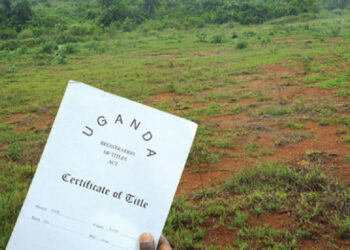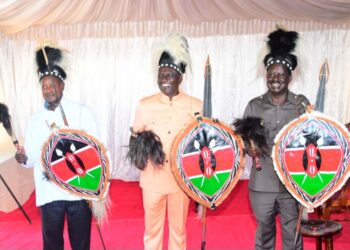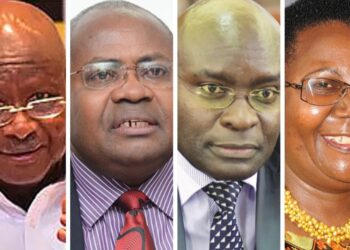In mid-September 2019, one honest legislator from West Budama South MP Mr Jacob Oboth Oboth opened up about his sex life. The MP said his love life was being affected not because he was cheating on his wife, or, that he was a bad husband not providing for his family. Mr Oboth’s problem was one – he lived in Mukono, on the eastern route from Kampala, along Jinja road. And this road has proved to have chronic traffic jams which delayed him and always reached home late in the night.
The MP submitted this complaint on the floor of August House, and whereas he threw his colleagues into laughter, the legislator was speaking for thousands of people who live or work in Kampala city and its surroundings.
Mr Oboth’s complaint came amidst one of the solutions for the jam, the Kampala-Jinja Expressway, which will be built at a tune of Shs3.6trillion ($1bn). It is a costly affair to save Oboth’s marriage. Meanwhile, there is another plan which actually can solve the problem of people such as Mr Oboth.
Tondeka Metro, is a bus service company that plans to roll out in the country in 2020. That is just next year. The bus company is a mass transit bus service that will ride on the expertise of a tested ASHOK Leyland of India, a subsidiary of Hinduja group in partnership with Uganda Development Corporation (UDC).
Bus service in our city, can fundamentally change the public transport system in Greater Kampala, reduce traffic jams in the metropolitan city area, create jobs, save commuters money and time, and make Kampala one of the few smartest cities on the continent.
Tondeka Metro has promised to invest in the super infrastructure which will give Uganda a modern public transport eco system with all its benefits and impact not only on time and money spent in transit, but also offering direct and indirect jobs to drivers, conductors, touts etc, as well as indirectly to bush washing, food suppliers, Stationery, etc…
This bus service will construct five terminals on major roads leading in and out of Kampala, and each terminal will be a new venture for the cash strapped local governments to collect revenue. The plan is to build “park and ride” safe spaces for private cars owners who can save money on fuel, board buses to the city and return home to find their vehicles safe, to return home.
Indeed, new cities are going to be created around these areas terminals will be constructed. More so, the tax business will still pick none car owners passengers to and from these terminals, a plan which will keep the taxi people in business and become partners with Tondeka Metro. Speaking to promoters of Tondeka over the weekend, it is clear that all stakeholders have been brought on board including matatu-bus owners, urban planners, government, and local government, to ensure smooth running of this project and have harmony in the business.
The local governments involved in negotiations include for a Greater Kampala transport ecosystem include KCCA, Mukono, Kira, Wakiso, Entebbe among others.
In the past KCCA has licensed some operators like Pioneer Easy Bus, UTODA Awakula Ennume cooperative society but couldn’t deliver due to various challenges like mode of financing which was short term and expensive finance. The technical incompetence in maintenance, manual ticketing which was prone to cash pilferage and no after sales services did not guarantee viability. The Buses were few and could not create an impact.
These, Tondeka Metro, has foreseen and resolved ahead of time.
To start with, Tondeka will bring in 980 buses from India. Because 980 buses are not enough, another 2,000 is planned in the near future. And this is how our new baby Kiira Motors should be smiling.
Tondeka has pitched to start assembling its buses using KIIRA motors infrastructure in Jinja. Kiira is a home-grown vehicle manufacturer whose hybrid products have been showcase in the past years.

In Tondeka Metro, Kiira Motors has a reliable market for its products, which will give Kiira viability since as the market gains trust in its vehicles. For now, Kiira depends on government funding, and in Tondeka, have an opportunity to beat two birds with one stone; they will have an actual market and a marketing vehicle for their products.
Because we have in the past run unsuccessful bus services in Kampala, the experience of Ashok Leyland will transfer skills and expertise from India as the Bus manufacturers will deliver an end to end transport solution for TONDEKA METRO BUS service that will cover Vehicle supply, local management, and technical skill development,- service workshop development, intelligent tracking solution(ITS),and financial support just like they have done and are doing in countries like Nigeria, Ghana, Senegal, Ivory Coast and many more.
ASHOK LEYLAND as the Bus manufacturer will not only offer the Buses but will also be involved in operations of the infrastructure depots/workshops. The maintenance of the Buses will be done by Ashland Motors Africa (EMA) the local dealer partner of Ashok Leyland registered in Uganda. They will be supported by ASHOK Leyland India who will provide and retain a competent senior management team and maintenance program for the duration of the project. The operation radius for the buses Terminals are going to be constructed within a distance of 20-30kms from the city centre on the 5 main routes out of the city. They will serve as Bus/Taxi and private car parks. They will also host other facilities like shops, Banks, fuel stations and the like. These parks will be operated by the current stake holders in the transport industry. These terminals will be the last stages for the Buses.
Effects of the project on the taxi industry Tondeka metro will not displace the current Taxi operators, but rather work with them to change the transport system in the city. All the key stake holders’ organizations like UTRADA, KOTSA, and the Taxi owners Association have been brought on board and are represented right from the board of directors to all working committees. Effectively most of the operational jobs like Drivers, Conductors, Inspectors, washing of Buses, will go to the current operators. When the loan is fully repaid Tondeka Metro will become a public limited company and float shares on the stock exchange. A significant portion of these shares will be reserved for the current stake holders. Their Sacco’s will be supported by Tondeka and they will remain in charge of the feeder routes. Silent Aspects Of The Project Tondeka Metro is going to deploy a JAN BUS of 90 passenger capacity both sited and standing. The Bus will be fitted with an electronic ticketing system using a smart card activated by an app.on a mobile phone or a vending machine. The funds will end up in an escrow account operated by UDC in BOU.
This will eliminate cash pilferage. A proportion of the funds will be returned to Tondeka Metro for operations and the balance applied on the loan. The Buses will have a ramp for the physically challenged passengers. They will be fitted with Intelligent Bus technology with GPS, security cameras, will be able to relay the trip information to a central data Bank. They are fuel efficient with limited emissions hence environmentally friendly. They are semi-automatic; making them easy to operate
QUICK FACTS ABOUT TONDEKA METRO
Transport fares;
Route Fare (UGX) Entebbe to Kampala UGX 1,200
Entire day UGX 3,500
Weekly travel UGX 17,500
Monthly travel UGX 55,000
Practically one will be able to travel from say Entebbe to Mukono, to Matugga and back to Entebbe at Shs 3500 as the ticket gives unlimited travel for card holder for an entire day.
Tondeka Metro will create between 6000-8000 jobs directly and over 20000 jobs indirectly
The project will save over usd 800000 In GNP hither to lost due traffic Jams.
The project will pay over sh420 bn over 7-year period.
Staff income tax will be over sh315bn over 7-year period.
NSSF contributions will amount to sh119bn over 7-year period
Local tax will range in sh8bn over same period.
Licence fees will amount to sh7bn over 7-year period.
Do you have a story in your community or an opinion to share with us: Email us at editorial@watchdoguganda.com











